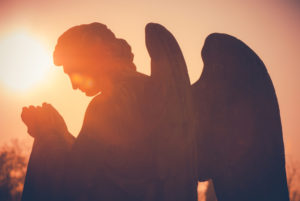
From religious writings to pop culture, angels repeatedly appear as divine messengers, helpful guides, or even enemies of humankind. Modern works such as the television series “Supernatural” and the “Devil May Cry” video game franchise prove that we remain enamored with them even in the 21st century. While most people think of angels within a Christian context, the concept of spiritual servants within a monotheistic theological framework originated in the ancient Middle East and continues with Abrahamic religions, New Age traditions, and popular culture today.
Angels in Judaism, Christianity, and Islam
The Online Etymology Dictionary divulges that our English word “angel” is derived from the Greek word “angelos,” which means “messenger.” Throughout the Tanakh, several Hebrew words are commonly used to refer to angelic beings:
- “Mal’akh,” usually translated as “angel,” “messenger,” or “ambassador”
- “Ma’lakh ‘Elohim,” typically rendered as “Angel of God”
- “Ma’lakh YHWH,” usually appearing as “the angel of the LORD”
One additional phrase, “bene ha Elohim,” has customarily been rendered as “sons of God.” Depending on where the phrase appears and who’s doing the interpreting, it can either refer to the descendants of Seth or angelic beings. Angels were thought to perform good deeds ranging from rescuing entire families from certain destruction to delivering promising prophecies, but they also killed thousands, foretold impending doom, and even rebelled against their Divine master.
Meanwhile, angels are also mentioned in several New Testament books and apocryphal Christian texts along with Islam’s Quranic writings and various Hadith. Our modern images of winged supernatural beings have been shaped by Christian art, starting with church-commissioned works as early as the fourth century C.E. Early theologians such as Saint John Chrysostom drew parallels between their wings and their sublime, heavenly nature.
Angelology and Possible Zoroastrian Influences
Some authors have theorized the Abrahamic concept of angels may have been partially shaped by Zoroastrian thought during the Jewish exile in Babylon during the sixth century B.C.E. Zoroastrian texts speak of ahuras and yazaras, two types of angelic beings. The Encyclopedia Britannica also points out that Zoroastrian astrology and astronomy grouped together seven celestial bodies and associated them with divine entities, using each one to represent noble characteristics or virtues.
Evidence of these concepts influencing the later development of Jewish angelology may exist in the Tanakh. The phrase “Lord of hosts” refers to the Abrahamic God’s leadership of a heavenly hierarchy that includes warriors, guardians, intercessors, rulers, messengers, and enforcers of divine authority. New Testament writers, Christian mystics, and other later Christian theologians such as Thomas Aquinas expanded these ideas into a classification and ranking system:
- First sphere: seraphim, cherubim, and thrones
- Second sphere: dominions, virtues, and powers
- Third sphere: principalities, archangels, and guardian angels
Esoteric and New Age Beliefs
The Jewish Virtual Library explains that Kabbalah originated as Jewish mystical ideas and practices, with roots in a foundational text known as the Zohar. Kabbalist concepts later entered Western esoteric and occultic traditions, thanks to groups such as the Hermetic Order of the Golden Dawn and the Theosophical Society. These and various New Age schools of thought adapted angels into their own belief systems, often associating them with divine or natural forces. Others regard them as mystical guides or protectors along with extraterrestrial beings, fairies, ancestors, or spiritually enlightened individuals such as ascended masters or bodhisattvas.
The Continued Fascination With Angels
Throughout much of history, humans have believed in supernatural protectors who aid humanity or act as messengers between us and the Divine. Like many other religious beliefs, the idea of heavenly advocates can provide comfort in times of trouble and uncertainty. While their existence is continually debated, our tendency to place faith in the unseen may mean that our fascination with angels won’t disappear anytime soon.

